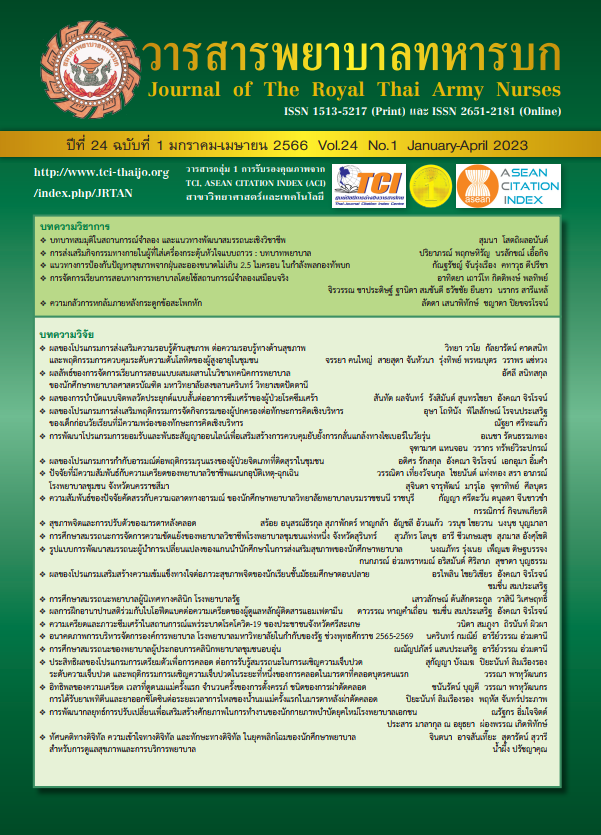The Effects of Applied Short-Term Psychodynamic Therapy on The Depressive Symptoms of Patients with Major Depressive Disorder
Keywords:
applied short-term psychodynamic therapy program, depressive symptoms, patients with major depressive disorderAbstract
The purpose of this Quasi-experimental research aimed to examine an applied short-term psychodynamic therapy program on the depressive symptoms of patients with major depressive disorder. The subjects of this study were 54 patients. The subjects were randomly assigned to the experimental and control groups with 27 patients in each group. The experimental group participated in the applied short-term psychodynamic therapy program, The duration of the individual intervention was eight sessions, each session lasting 45 to 60 minutes. The control group received routine care. The research instruments consisted of 1) the applied short-term psychodynamic therapy program, which was validated by three experts, and 2) the Hamilton rating scale for depression (Thai version), whose reliability was determined with a Cronbach’s alpha coefficient of .78. The data were analyzed using descriptive statistics and t-test. The results of the study were as follows.1) The mean score for the depressive symptoms of the experimental group after participating in the applied short-term psychodynamic therapy program (M = 11.15, SD = 1.70) was significantly lower than the mean score for the depressive symptoms (M = 21.96, SD = 1.76) before participating in the program (t = 21.97, p < .05). 2) The mean difference in the depressive symptoms between the pretest and posttest depressive mean score for the experimental group that participated in the applied short-term psychodynamic therapy program (1 = 10.81, SD = 1.70) was significantly greater than that of the control group that received routine care (2 = 6.63, SD = 1.87) (t = 7.09, p <.05).
In summary, the applied short-term psychodynamic therapy program was able to effectively reduce the depressive symptoms of patients with major depressive disorder. Thus, the program can be used as an alternative activity or program to reduce the depressive symptoms of this group of individuals.
Downloads
References
Vipulakorn, P. Department of Mental Health, Thai Mental Health Survey. Retrieved 2015. (In Thai).
Sadock, J.B., & Sadock, A.V. Synopsis of psychiatry. (11thed.). Philadelphia: Lippincott Williams & Wilkins.2016.
Akwarangkoon S. Roojak Doolae Khaojai Phawa Suemsao, Bangkok. 2012. (In Thai)
Beck, A.T. Depression. Harper and Row: New York. 1967
Pliankerd P., Depressive disorder: Nurse’s role in nursing care. Journal of the Royal Thai Army Nurses. 2014; 15 (1), 18-21. (in Thai)
Christopher Perry J., Michael Bond, Addressing Defenses in Psychotherapy to Improve Adaptation. A Topical Journal for Mental Health Professionals. 2017; 37:153-66
Nezu, A. M., & Nezu, C. M. Problem solving. In W. T. O’ Donohue & J. E. Fisher (Eds.), Cognitive behavior therapy: Core principles for practice. 2012; 159–82.
Abbass AA, Kisely SR, Town JM, Leichsenring F, Driessen E, De MS, et al. Short- term psychodynamic psychotherapies for common mental disorders. Cochrane Database Systematic Review. 2014: 71-87.
Driessen E, Hegel Maier LM, Abbass AA, Barber JP, Dekker JJ, Van HL, et al. The efficacy of short-term psychodynamic psychotherapy for depression: a meta-analysis update. Clinical Psychiatry Reviews. 2015; 42:115.
Eppel A., Short-Term Psychodynam ic Psychotherapy. Springer International Publishing AG .2018; 225(1): 149-85.
Leichsenring F, Schauenburg H. empirically supported methods of short-term psychodynamic therapy in depressiontowards an evidence-based unified protocol. Journal of Affective disorders. 2014:128-43.
Gibbons, M. B. C., et al, Supportive-expressive dynamic psychotherapy in the community mental health system: A pilot effectiveness trial for the treatment of depression. Psychotherapy. 2012; 49(3): 303–16.
Huannet P. et al, the effect of the resilience enhancement on self- esteem of self-esteem of depressive patients. The Journal of Psychiatric Nursing and Mental Health. 2018; 32 (2): 39-50. (in Thai)
Tangtekakul S., The effect of integrated perceived stressful life event management program on depression of depressive disorder patients in community. The journal psychiatric nursing and mental health. 2017; 31(1): 133-47. (in Thai)
Kaewsawang T., Defense Mechanism and Mental Health in HIV Infected Patients. The Public Health Journal of Burapha University. 2018; 13(2): 39-49 (in Thai).
Downloads
Published
How to Cite
Issue
Section
License
Copyright (c) 2023 Journal of The Royal Thai Army Nurses

This work is licensed under a Creative Commons Attribution-NonCommercial-NoDerivatives 4.0 International License.
บทความหรือข้อคิดเห็นใดใดที่ปรากฏในวารสารพยาบาลทหารบกเป็นวรรณกรรมของผู้เขียน ซึ่งบรรณาธิการหรือสมาคมพยาบาลทหารบก ไม่จำเป็นต้องเห็นด้วย
บทความที่ได้รับการตีพิมพ์เป็นลิขสิทธิ์ของวารสารพยาบาลทหารบก
The ideas and opinions expressed in the Journal of The Royal Thai Army Nurses are those of the authors and not necessarily those
of the editor or Royal Thai Army Nurses Association.






